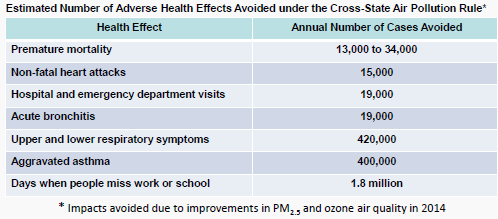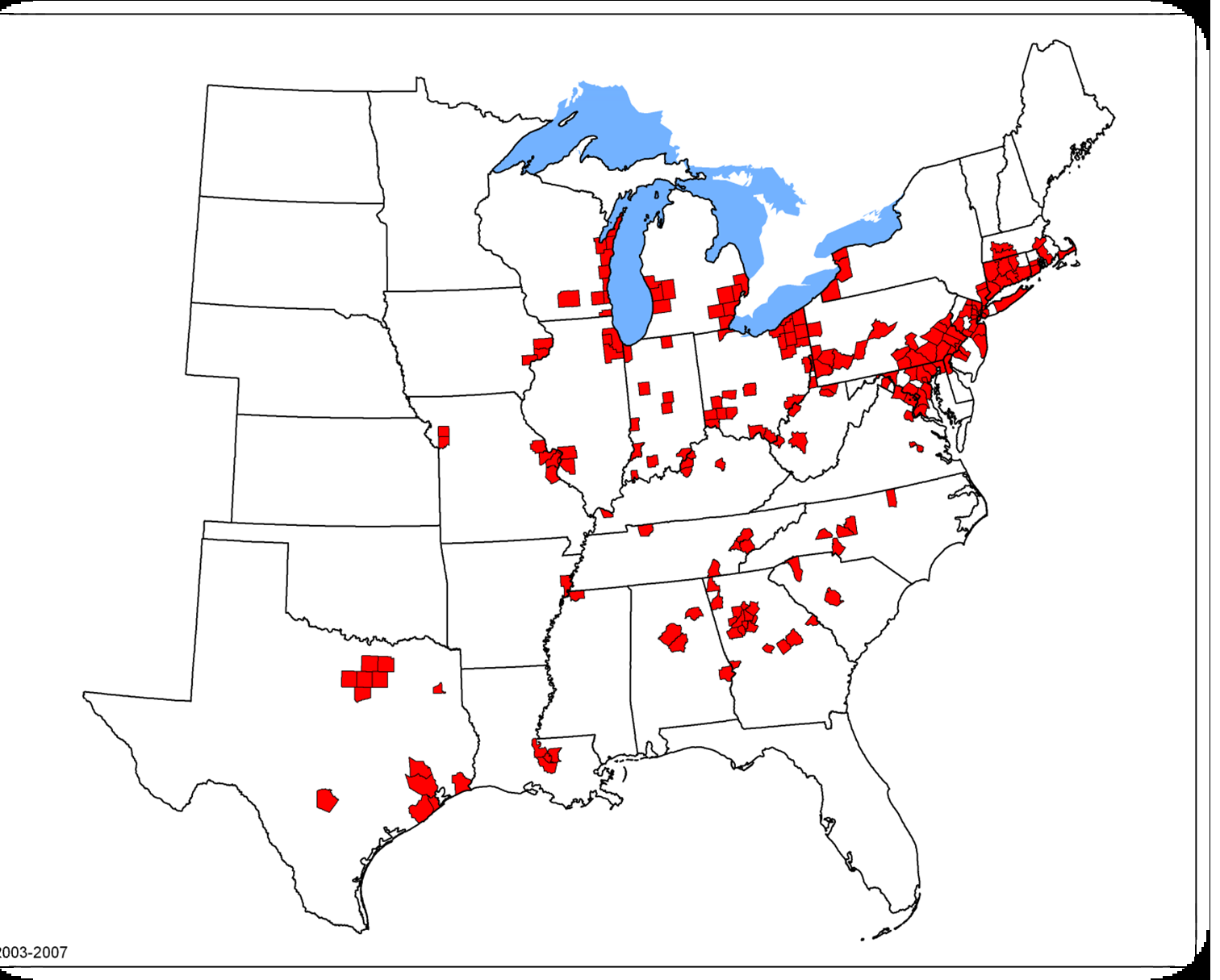Under the Clean Air Act, the EPA is required to protect states from sulfur dioxide and nitrogen oxide pollution emitted from coal plants in other states. After dragging its feet for a while, the Bush administration introduced the Clean Air Interstate Rule in 2005. Due to its over-reliance on emissions trading, the Clean Air Interstate Rule was shot down (PDF) in December 2008 by the U.S. Court of appeals for the District of Columbia. One year ago today, the Obama administration proposed a plan — the Clean Air Transport Rule — to replace the Bush administration’s flawed Clean Air Interstate Rule.
Finally, today, the EPA finalized an updated version of this rule, now appropriately named the Cross-State Air Pollution Rule (large PDF), which requires power plants in 27 eastern states and the District of Columbia to significantly reduce sulfur dioxide and nitrogen oxide pollution.
The public health benefits of this rule, which goes into effect at the beginning of 2012, promise to be enormous (PDF, p. 12): 
The air quality improvements will also be tremendous, with the number of counties in violation of federal standards expected to drop from 207 to just two as soon as 2014. Here are the counties that violated air quality standards between 2003 and 2007 (PDF, p. 30): 
And here are the two counties that are projected to be in violation by 2014 (PDF, p. 31), as well as the six that are projected to have maintenance problems:  Justifiably, the rule was praised today by countless respected people and organizations. Here’s a joint statement released this afternoon by Environment America, the Natural Resources Defense Council, the League of Conservation Voters, Environmental Defense Fund and the Sierra Club:
Justifiably, the rule was praised today by countless respected people and organizations. Here’s a joint statement released this afternoon by Environment America, the Natural Resources Defense Council, the League of Conservation Voters, Environmental Defense Fund and the Sierra Club:
Stronger limits for power plant pollution will mean healthier, longer lives for millions of Americans. Smokestack emissions from power plants threaten public health by delivering harmful pollutants like sulfur dioxide, greenhouse gases and toxic mercury into the air we breathe and the water we drink, posing a particular threat to children and vulnerable populations like seniors. This much-needed update to clean air standards will significantly reduce the threat from this pollution and save lives.
Here’s Delaware Senator Tom Carper:
The EPA has developed a sensible approach that will reduce smog and particle pollution and in turn, give us cleaner air and prevent thousands of deaths and billions of dollars in healthcare costs. In the end, this rule will help us achieve better health care results for less money.
And here’s Dr. Georges C. Benjamin, Executive Director of the American Public Health Association:
Today’s ruling is an important and long overdue step to protect the health of Americans and clean up our environment. It’s a huge win-win. We praise EPA for its continued efforts to help create stronger, healthier and more productive communities for ourselves and our families.
Care to guess who criticized the rule? That’s right — Republican politicians and the coal industry. Here’s Texas Governor, potential GOP presidential candidate and former Al Gore supporter Rick Perry, who told Glenn Beck last week that he didn’t think the federal government should enforce clean air laws at all:
Today’s EPA announcement is another example of heavy-handed and misguided action from Washington, D.C., that threatens Texas jobs and families and puts at risk the reliable and affordable electricity our state needs to succeed.
Here’s the American Coalition for Clean Coal Electricity, which was caught sending fraudulent letters to members of Congress in August 20009:
America’s coal-fueled electric industry has been doing its part for the environment and the economy, but our industry needs adequate time to install clean coal technologies to comply with new regulations. Unfortunately, EPA doesn’t seem to care.
And here’s Pat Hemlepp, spokesman for American Electric Power:
Taking power plants out of service like this pulls tax dollars out of the communities, pulls jobs out of communities, in addition to increasing electricity costs
One side says this new rule will save tens of thousands of lives and improve air quality for 240 million Americans. They’re absolutely right. The other side says the rule is costly and unnecessary and will kill countless jobs. While this is mostly coal-industry spin, there is a kernel of truth to it. Implementing pollution controls on out-of-date coal-fired power plants is somewhat expensive, and if some plants choose to close down rather than modernizing, jobs will be lost. But as Harvard economist Robert Stavins explains, this is a more than worthwhile tradeoff. “It doesn’t mean that there are no costs, but the benefits of the transport rule in terms of human health protection tremendously outweigh the costs of this,” he told NPR.
Ultimately, that is what this rule comes down to. There are unintended consequences to nearly every action the government takes, but as a society, we’ve decided that saving thousands of lives and making it easier to breathe for hundreds of millions of Americans is a higher priority than protecting the profits of an unscrupulous industry. I think that’s a pretty wise decision, and I’m proud of the EPA for having the courage to go through with it while facing a seemingly endless onslaught of hysterical attacks.



